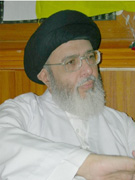|
|
||
|
|
|
|
| Translated by Zulqurnain Haider | ||
|
Charter of Demand for the elections 2013 1. Since Pakistan is the result of the mutual struggle and efforts of all the schools of thought and that is why Hazrat Quaid e Azam Muhammad Ali Jinnah declared this in his speeches and addresses that all the schools of thought will have equal rights on Pakistan, which is a welfare Islamic Republic state. Thus all the inhabitants of Pakistan, including non-Muslim minorities should be given equal rights and all should have the right to spend their lives according to their socio-religious norms. In accordance with the above mention principle, to fail the idea of making Pakistan a sectarian state during the tyranny of Zia, Tehreek e Nafaz e Fiqh Jafariya staged agitation for eight months, which ended in resulting Moosavi-Junaejo Accord of May 21st, 1985. The points of this accord are as under: a. Implementation of Fiqh-e-Jafariya for Shias of Pakistan b. Instigation of separate academic syllabus of Islamic studies, for male and female Shia students, in education institute c. Induction of Shia faculties in all the Islamic universities of d. Appointment of Shia Judges in Federal Sharia Court e. Shia representation in all the High-level Courts f. Shia representation in media on the basis of equality g. No ban on the mourning processions of Imam Hussain (PBUH) h. Establishment of separate Shia Oqaaf Board i. Shia representation in Islamic Ideological Council on the basis of equality j. Cancellation of the amendment made in the Police Act 1861, Article 30(3)k. Reconstruction of the smashed tombs and graves of Janatul Baqi and Janatul Mualla 2. Under the constitution of Pakistan the eligibility to be the president of Pakistan is not to be related to any specific sect or caste but to be a Muslim. But the presidents of different institutions of the country have continuously been selected from specific school of thought, which is completely against the principles of the constitution. This wrong custom should be ended and, including Islamic Ideological Council, Federal Sharia Court and Royat Hilal Committee, in all the departments Shia representation should be ensured on the basis of equality. 3. As per Article # 2 of the constitution of Pakistan, the official religion of the country is Islam, not any specific sect, and Shia and Sunni both are sects of Islam. Naming any of these sects as non-Muslim is completely against the constitution of Pakistan thus, to ensure that calling any Muslim as Non-Muslim and to make it a part of the Criminal Act backed by penalty, a resolution should be moved in the National Assembly. 4. In accordance with the policy, Tehreek e Nafaz e Fiqh e Jafariya is not contesting for the elections, however being a major vote bank, whosoever political party will ensure the implementation of the above mention Charter of Demand in black and white, will be supported and the Central representatives of the Tehreek e Nafaz e Fiqh e Jafariya will announce their support with the members of the Pledge-Giving party through a press conference. Allegiance is not subject to the success of the party. If the party came as opposition in the assembly, even then they will be bound to raise the voice for the rights of Shia School of thought. 5. Terrorism has turned to be the greatest problem of the country. To root out this menace, Moosavi Peace Formula, which was presented by the Tehreek e Nafaz e Fiqh Jafariya on the self-notice of then the Chief Justice of Pakistan Syed Sajjad Ali, which is on the record of the Supreme Court of Pakistan, is a guaranteed solution against terrorism. Its implementation should be ensured.
May Allah protect the citizens of Pakistan (Amen).
Syed Mazhar Ali Shah Advocate (The general secretary of the Tehreek Nafaz e Fiqh e Jafariya)
|
||
|
|
||
|
|
||



